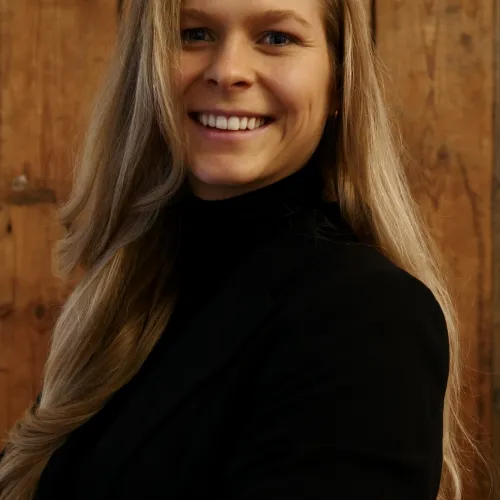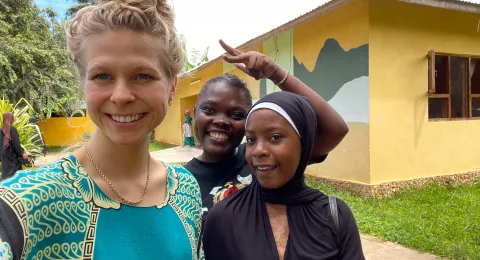The newsletter is your guide to what's happening on LUT campuses and the student community as well as to bachelor's and master's programmes updates and admission instructions.
Emmi Smolander, LUT master's student in environmental engineering and growth entrepreneur, finds herself far from the grey Finnish landscape in November. She is running an entrepreneurship bootcamp for local women in Kenya for the second time.
“The role of women in Kenya largely revolves around the home, and there is still a long way to go to achieve equality, especially in rural areas. However, the women participating in the entrepreneurship bootcamp have the support of the head of the family – typically the husband – since they are allowed to participate and leave household chores behind,” says Smolander.
The entrepreneurship bootcamp was created through a collaboration involving the non-governmental organization (NGO) Ambitious.Africa, the LUTES student entrepreneurship society, and the Home Street Home (HSH) organization.
“It’s been wonderful to see how dedicated the women are, how much they progress over the week, and above all, how women’s entrepreneurship changes the whole village community and the standard of living of the women’s children,” describes Maija Luukka, a junior researcher in industrial engineering and management at LUT and one of the founders of Ambitious.Africa.
Collaborative bridges between Africa and the Nordic countries
Ambitious.Africa builds collaborative bridges between Africa and the Nordic countries, following the 3E model: education, entrepreneurship, and entertainment.
“Although entrepreneurship programs are at the core of Ambitious.Africa’s activities, our typical target audience is university students. Therefore, the collaboration with the HSH organization is unique,” Luukka explains.
Luukka initially worked on entrepreneurship programs through LUTES and later through Ambitious.Africa. She reached out to friends at LUTES, who were inspired to develop a customized entrepreneurship program for Makongeni. The non-profit Home Street Home, with roots in both Finland and Kenya, became a partner.
Luukka and Viola Wallenius, one of HSH’s founders, connected through Instagram.
“It turned out that few of the women using HSH’s services knew how to utilize the skills they acquired at the center or other talents in entrepreneurship,” Luukka says.
The camp’s content focuses on basic entrepreneurship concepts – what entrepreneurship means, how to manage bookkeeping, and the role of investors. Luukka notes that while women in Makongeni work hard and set up small stands all around, their business skills are almost non-existent.
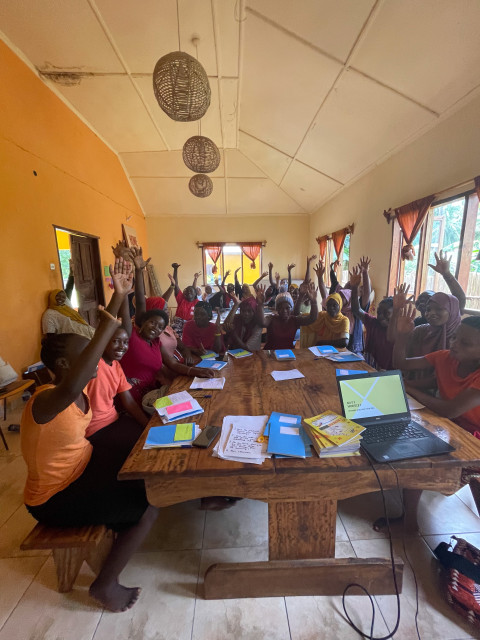
Luukka has been involved in trips to Kenya since the project began, making her fourth trip this year.
“Visits to Makongeni and Nairobi are always great learning experiences. They have increased my understanding of East Africa’s economic development and startup culture. It’s also been interesting to think about how to simplify business basics and focus on what’s essential,” Luukka explains.
“Gender roles are male-dominated in Makongeni, partly due to the local religion, Islam.
I've gained much perspective on the world, how cultures shape us profoundly, and what Finnish equality really means.”
According to Smolander, women at the camp are shyer when working in groups compared to Finnish women and tend to become quiet if men are present.
“That’s why it’s crucial that the message is conveyed from woman to woman, so to speak.”
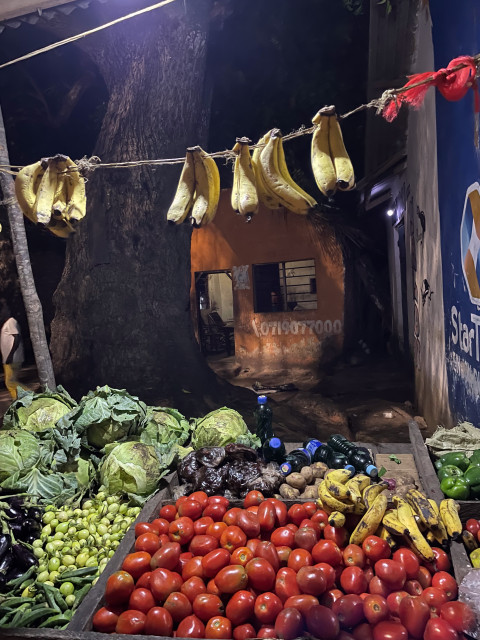
“The three-day entrepreneurship camp made me feel that I matter.”
LUT Business School has worked closely with the Ambitious.Africa NGO and LUTES on various initiatives over the years. The entrepreneurship bootcamp in Kenya is one of the projects supported annually by the school, with funding secured for four years.
Post-doctoral Researcher Igor Laine is one of the figures behind the Kenya project and says that many master's students from the international business and entrepreneurship programme and doctoral students from the school have contributed to the camp. This year, Junior Researcher Anna Sidorenko from LUT Business School will also participate.
LUT Business School offers volunteers travel grants covering all travel expenses, including vaccinations, transportation, and accommodation. The school’s secretary has assisted with bureaucratic processes.
“Additionally, the school’s researchers and teachers ensure that the workshop materials are appropriate for their purpose. Presentation materials for the camp have been reviewed with some of our entrepreneurship course instructors,” says Laine.
The camp hosts 20–30 women each year.
“Feedback has shown that the women especially appreciate the chance to reflect on their strengths and the kinds of entrepreneurship they might be suitable for,” says Emmi Smolander.
One woman described the camp’s impact as follows:
“The three-day entrepreneurship camp made me feel that I matter.”
Supporting women's entrepreneurship advances equality and children's well-being
Viola Wallenius, who lives in Makongeni, says that locals have always praised the camp’s content. According to Wallenius, several women who attended the camp have gone on to implement their business plans, establishing sewing shops, beauty businesses, or food stands.
Wallenius works at the center founded by the HSH organization. In Kenya, HSH also operates a women’s training center in collaboration with Kalevala Jewelry: the Kalevala Training Center. Its programs target young women from disadvantaged backgrounds who have, for various reasons, dropped out of school.
The training center offers three different programs: a hairdressing certificate, a sewing certificate, and an IT certificate. Participants for the LUT-supported entrepreneurship course are selected from among these students.
“We follow up on our graduates through our alumni network. We choose alumni for the entrepreneurship bootcamp who are interested in starting their own business or have already embarked on the path of entrepreneurship,” says Wallenius.
Wallenius explains the philosophy of the training center.
“We believe our training center not only helps individual young people but can also change attitudes, develop the entire community, and create more sustainable and equal futures.
Women can show by example that, despite challenges, they can rise and achieve their dreams.”
When women succeed as entrepreneurs, they can serve as role models for other women and girls.
“They can inspire the next generation to take a more active role in the community and make decisions about their personal lives. This, in turn, promotes gender equality and can change traditional perceptions of women’s roles in society,” Wallenius says.
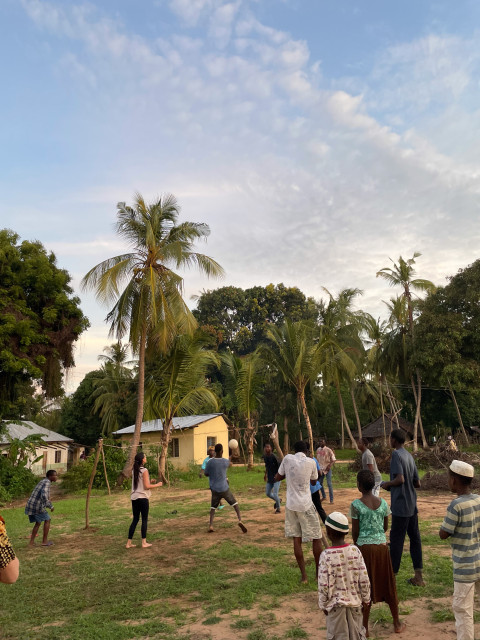
Happy on a 200-euro monthly salary
When planning the camp, local culture needed to be taken into account, such as scheduling time for prayer time and considering weather conditions. When it rains, some women may need to stay home to fix a leaking roof made of palm leaves.
Trips to Kenya require careful preparation: numerous vaccinations are needed, and the women must leave their jewelry at home and pack clothes that cover most of their bodies. Ensuring safety is a big part of the journey.
“We travel in groups of four so that we can fit into the same car. In Nairobi, it’s not safe for a woman to walk alone for even a hundred meters,” Smolander explains.
The pale-skinned Nordic visitors draw much attention on the streets. However, the heat and humidity are the most challenging adjustment – towels, for instance, don’t dry during the three-day bootcamp.
“The heat also affects your thinking, making it feel sluggish. In Finland, I’m very efficient and quick, but in Kenya, I have to adapt to the local laid-back sense of time, where punctuality isn’t a priority,” Smolander laughs.
The Finnish group spends ten days at a time in Kenya, and Smolander has learned a lot in that time. She was struck by how happy the local women are and how children take pleasure in small things.
“One girl played with my long nails, softened by the heat. She was incredibly fascinated by them.”
Smolander believes that Western anxiety stems from an abundance of possibilities.
“In Kenya, the average salary is 200 euros a month, but people are more content with their lives than we are. They’re not on social media or news feeds and thus aren’t constantly comparing themselves to others. Here, we’re unhappy despite our material wealth.”
Photos: Maija Luukka
More information:
